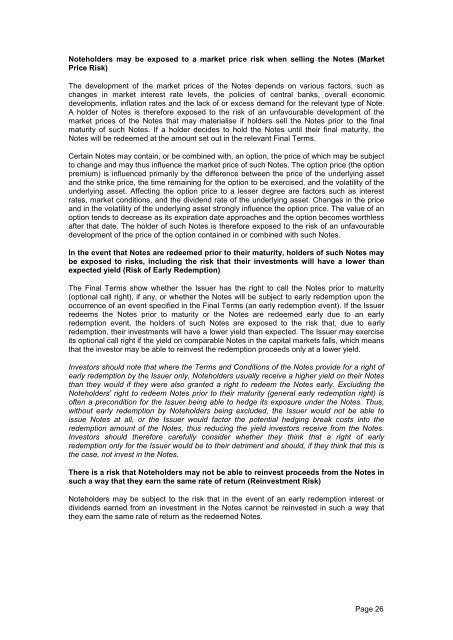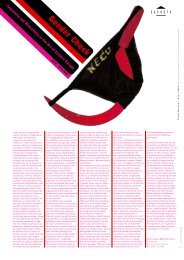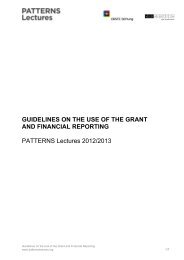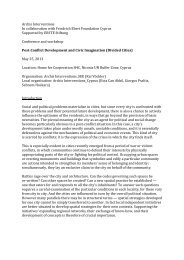DIE ERSTE österreichische Spar-Casse ... - ERSTE Stiftung
DIE ERSTE österreichische Spar-Casse ... - ERSTE Stiftung
DIE ERSTE österreichische Spar-Casse ... - ERSTE Stiftung
Create successful ePaper yourself
Turn your PDF publications into a flip-book with our unique Google optimized e-Paper software.
Noteholders may be exposed to a market price risk when selling the Notes (Market<br />
Price Risk)<br />
The development of the market prices of the Notes depends on various factors, such as<br />
changes in market interest rate levels, the policies of central banks, overall economic<br />
developments, inflation rates and the lack of or excess demand for the relevant type of Note.<br />
A holder of Notes is therefore exposed to the risk of an unfavourable development of the<br />
market prices of the Notes that may materialise if holders sell the Notes prior to the final<br />
maturity of such Notes. If a holder decides to hold the Notes until their final maturity, the<br />
Notes will be redeemed at the amount set out in the relevant Final Terms.<br />
Certain Notes may contain, or be combined with, an option, the price of which may be subject<br />
to change and may thus influence the market price of such Notes. The option price (the option<br />
premium) is influenced primarily by the difference between the price of the underlying asset<br />
and the strike price, the time remaining for the option to be exercised, and the volatility of the<br />
underlying asset. Affecting the option price to a lesser degree are factors such as interest<br />
rates, market conditions, and the dividend rate of the underlying asset. Changes in the price<br />
and in the volatility of the underlying asset strongly influence the option price. The value of an<br />
option tends to decrease as its expiration date approaches and the option becomes worthless<br />
after that date. The holder of such Notes is therefore exposed to the risk of an unfavourable<br />
development of the price of the option contained in or combined with such Notes.<br />
In the event that Notes are redeemed prior to their maturity, holders of such Notes may<br />
be exposed to risks, including the risk that their investments will have a lower than<br />
expected yield (Risk of Early Redemption)<br />
The Final Terms show whether the Issuer has the right to call the Notes prior to maturity<br />
(optional call right), if any, or whether the Notes will be subject to early redemption upon the<br />
occurrence of an event specified in the Final Terms (an early redemption event). If the Issuer<br />
redeems the Notes prior to maturity or the Notes are redeemed early due to an early<br />
redemption event, the holders of such Notes are exposed to the risk that, due to early<br />
redemption, their investments will have a lower yield than expected. The Issuer may exercise<br />
its optional call right if the yield on comparable Notes in the capital markets falls, which means<br />
that the investor may be able to reinvest the redemption proceeds only at a lower yield.<br />
Investors should note that where the Terms and Conditions of the Notes provide for a right of<br />
early redemption by the Issuer only, Noteholders usually receive a higher yield on their Notes<br />
than they would if they were also granted a right to redeem the Notes early. Excluding the<br />
Noteholders' right to redeem Notes prior to their maturity (general early redemption right) is<br />
often a precondition for the Issuer being able to hedge its exposure under the Notes. Thus,<br />
without early redemption by Noteholders being excluded, the Issuer would not be able to<br />
issue Notes at all, or the Issuer would factor the potential hedging break costs into the<br />
redemption amount of the Notes, thus reducing the yield investors receive from the Notes.<br />
Investors should therefore carefully consider whether they think that a right of early<br />
redemption only for the Issuer would be to their detriment and should, if they think that this is<br />
the case, not invest in the Notes.<br />
There is a risk that Noteholders may not be able to reinvest proceeds from the Notes in<br />
such a way that they earn the same rate of return (Reinvestment Risk)<br />
Noteholders may be subject to the risk that in the event of an early redemption interest or<br />
dividends earned from an investment in the Notes cannot be reinvested in such a way that<br />
they earn the same rate of return as the redeemed Notes.<br />
Page 26










